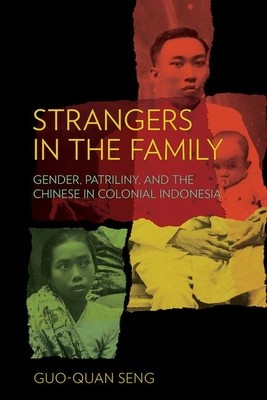
- We will send in 10–14 business days.
- Author: Guo-Quan Seng
- Publisher: Southeast Asia Program Publications
- ISBN-10: 1501772503
- ISBN-13: 9781501772504
- Format: 15.2 x 22.9 x 1.9 cm, kieti viršeliai
- Language: English
- SAVE -10% with code: EXTRA
Gender, Patriliny, and the Chinese in Colonial Indonesia (e-book) (used book) | bookbook.eu
Reviews
Description
In Gender, Patriliny, and the Chinese in Colonial Indonesia Guo-Quan Seng provides a gendered history of settler Chinese community formation in Indonesia during the Dutch colonial period (1816-1942). At the heart of this story lies the creolization of patrilineal Confucian marital and familial norms to the colonial legal, moral and sexual conditions of urban Java.
Departing from male-centered narratives of Overseas Chinese communities, Gender, Patriliny, and the Chinese in Colonial Indonesia tells the history of community-formation from the perspective of women who were subordinate to, and alienated from, full Chinese selfhood. From native concubines and mothers, creole Chinese daughters, wives and matriarchs, to the first generation of colonial-educated feminists, Seng showcases women's moral agency as they negotiated, manipulated and debated men in positions of authority over their rights in marriage formation and dissolution. In dialogue with critical studies of colonial Eurasian intimacies, this book explores Asian-centered inter-ethnic patterns of intimate encounters. It shows how contestations over women's place in marriage and in society were formative of a Chinese racial identity in colonial Indonesia.
EXTRA 10 % discount with code: EXTRA
The promotion ends in 23d.21:56:14
The discount code is valid when purchasing from 10 €. Discounts do not stack.
- Author: Guo-Quan Seng
- Publisher: Southeast Asia Program Publications
- ISBN-10: 1501772503
- ISBN-13: 9781501772504
- Format: 15.2 x 22.9 x 1.9 cm, kieti viršeliai
- Language: English English
In Gender, Patriliny, and the Chinese in Colonial Indonesia Guo-Quan Seng provides a gendered history of settler Chinese community formation in Indonesia during the Dutch colonial period (1816-1942). At the heart of this story lies the creolization of patrilineal Confucian marital and familial norms to the colonial legal, moral and sexual conditions of urban Java.
Departing from male-centered narratives of Overseas Chinese communities, Gender, Patriliny, and the Chinese in Colonial Indonesia tells the history of community-formation from the perspective of women who were subordinate to, and alienated from, full Chinese selfhood. From native concubines and mothers, creole Chinese daughters, wives and matriarchs, to the first generation of colonial-educated feminists, Seng showcases women's moral agency as they negotiated, manipulated and debated men in positions of authority over their rights in marriage formation and dissolution. In dialogue with critical studies of colonial Eurasian intimacies, this book explores Asian-centered inter-ethnic patterns of intimate encounters. It shows how contestations over women's place in marriage and in society were formative of a Chinese racial identity in colonial Indonesia.


Reviews